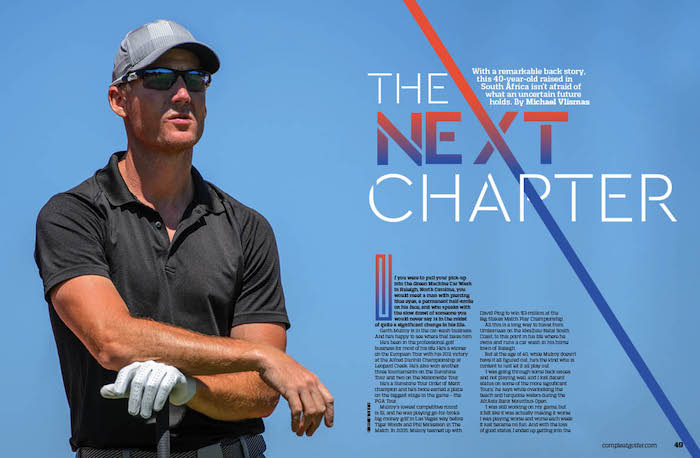With a remarkable back story, this 40-year-old raised in South Africa isn’t afraid of what an uncertain future holds, writes MICHAEL VLISMAS in Compleat Golfer.
If you were to pull your pick-up into the Green Machine Car Wash in Raleigh, North Carolina, you would meet a man with piercing blue eyes, a permanent half-smile on his face, and who speaks with the slow drawl of someone you would never say is in the midst of quite a significant change in his life.
Garth Mulroy is in the car-wash business. And he’s happy to see where that takes him.
He’s been in the professional golf business for most of his life. He’s a winner on the European Tour with his 2011 victory at the Alfred Dunhill Championship at Leopard Creek. He’s also won another three tournaments on the Sunshine Tour and two on the Nationwide Tour.
He’s a Sunshine Tour Order of Merit champion and he’s twice earned a place on the biggest stage in the game – the PGA Tour.
Mulroy’s lowest competitive round is 61, and he was playing go-for-broke big-money golf in Las Vegas way before Tiger Woods and Phil Mickelson in The Match. In 2005, Mulroy teamed up with David Ping to win $3-million at the Big Stakes Match Play Championship.
All this is a long way to travel from Umkomaas on the KwaZulu-Natal South Coast, to this point in his life where he owns and runs a car wash in his home town of Raleigh.
But at the age of 40, while Mulroy doesn’t have it all figured out, he’s the kind who is content to just let it all play out.
‘I was going through some back issues and not playing well, and I lost decent status on some of the more significant Tours,’ he says while overlooking the beach and turquoise waters during the AfrAsia Bank Mauritius Open.
‘I was still working on my game, but it felt like it was actually making it worse. I was playing worse and worse each week. It just became no fun. And with the loss of good status, I ended up getting into the car-wash business in the US. It’s been a year and a half now, and golf just wasn’t even a thought. I think I went through a patch of eight months when I didn’t touch a club.’
Strangely, though, for a man frustrated by the game, it was watching the toughest form of it that sparked a desire to play again.
‘I watched The Open Championship in 2018 and the bug kind of bit again. It’s always fun watching the Majors and on a course like Carnoustie where I’ve played well. I came back to play in South Africa with low expectations and I had a few good finishes. I felt like I could hit a decent shot again and make a birdie rather than just chip and putt for pars all day. So the desire was there a little bit again.’
And it led to his victory at the 2018 Vodacom Origins of Golf in Parys, his first professional title in seven years.
But as pleasing as the win was, Mulroy is extremely realistic about where he stands in the game and the decision he’s made to explore a life outside golf.
‘It wasn’t a particularly tough decision to make when you look at my results. You just see so many players trying to plug along for longer than they should and they end up getting themselves in a hole.
‘You need to know when you are tired of playing the way you are, and for me that point was when I saw no improvement in my game. Knowing the seasons I’d had before and how I could play, to continue playing like that made it quite an easy decision for me.’
The recurring back issues compounded that loss of form. But you will not get any definitive sense of an excuse coming out of the mouth of Mulroy. It just is what it is for him, and he’s happy to say it through that lopsided smile of his.
‘You know, I’ll play a few events in South Africa because I have status on the Sunshine Tour through my win there. And if I make a cheque or two on the Web.com Tour I may get in a few events there through the re-rank. They’re short-term goals, but also the only realistic options for me at the moment.’
Looking back at his time on the PGA Tour, Mulroy says he’d approach that differently if it ever came his way again.
‘For me it was definitely a case of suddenly playing with guys you’ve looked up to your whole life. But in the end it doesn’t matter what your name is. At the end of the day you’re hitting a golf ball and that’s it. I think I was too focused on what everybody else was doing instead of what I was supposed to be doing. You need to remember what got you there in the first place.
‘But, golf can be funny in the sense that you never really feel like you’ve accomplished something. There’s no end point. You finish Sunday and then you start again on Monday. You win on Sunday and on Monday you’re like everybody else again.
‘I’d like to play more, but if I can’t make money playing I need to be focusing on something else. Growing up, I was never going to be a pro golfer. Everything was rugby for me and I played a bit of club rugby after school. But I got hurt a few times and my old man suggested golf. Tim Clark then suggested I go over to play college golf in America, which I did. And it was really just a case of, well, I may as well give this pro thing a go and see what happens.’
Perhaps it’s exactly this nonchalance with which he started his professional career that makes it so easy for Mulroy to know when to move away from it too. And that’s something he believes every young professional should prepare himself for.
‘The dangerous part is having to reset your career at a later age when you’ve stuck at it for too long without real success. If you’re shooting a few under par at your Saturday afternoon club competition and the members are telling you to turn pro, that’s just not realistic. The cheerleaders at your home club are not what you should base your decision on. Give it a go, sure, but have a definite timeline on it if it doesn’t work out.’
As for any particular highlights in his career, Mulroy points to the showdown between Woods and Mickelson. ‘Up until The Match, I had played and won the biggest first-place cheque in world golf with the Big Stakes event in Las Vegas. That was probably the best golf I’ve played in my life.
‘In the fourth match of that event I was 12-under on my own ball through 15 holes. I made a hole-in-one, a two on a par four and a three on a par five all in the same round. What annoyed me in that match is that I made the ace and neither one of the guys we were playing against said, “Good shot.” So I said to my partner, “Now we’re going to beat the crap out of this lot.” The next day I birdied the first five holes. I had a 20-hole stretch where I was 17-under. I think I needed a few more of those highlights in my career.
‘But hey, that was fun.’
FLASHBACK: MAY 2005
To be eligible for the Big Stakes, players could not have held an exemption on any major Tour within the previous three years, but most of the entrants were talented golfers. Sixty-four teams vied for a piece of the $6.4-million purse.
A team had to win at least two matches to earn back its entry fee, claiming more cash for each victory. Garth Mulroy, then 26, paired with David Ping (27) and outlasted club pros Mark Mielke and Rick Hartmann to earn victory at the inaugural Big Stakes Match Play, claiming the $3-million grand prize by winning 2-up. Ping and Mulroy, both mini-tour professionals, split the money and paid back their sponsors, NFL linemen Barry Stokes and Ross Verba. Stokes, of the Atlanta Falcons, and Verba, of the Cleveland Browns, split the $100 000 entry fee to sponsor Mulroy and Ping.
– This article first appeared in the January issue of Compleat Golfer








